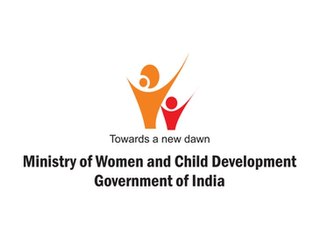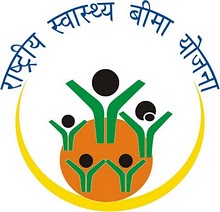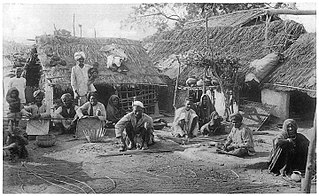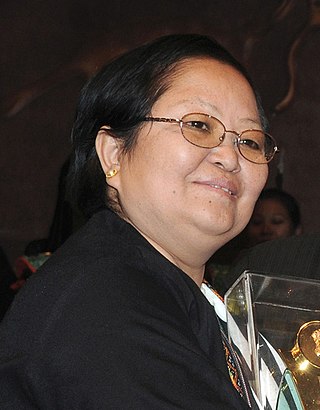
The Scheduled Castes and Scheduled Tribes are officially designated groups of people and among the most disadvantaged socio-economic groups in India. The terms are recognized in the Constitution of India and the groups are designated in one or other of the categories. For much of the period of British rule in the Indian subcontinent, they were known as the Depressed Classes.

Arjun Munda is an Indian politician. He is the current Minister of Tribal Affairs and Minister of Agriculture and Farmers' Welfare in the Second Modi ministry. He is a member of the Bharatiya Janata Party. He was also Chief Minister of the Indian state of Jharkhand. He has also served as a member of parliament, having been elected to the 15th Lok Sabha from the Jamshedpur constituency in the 2009 parliamentary elections. The BJP's central leadership appointed him a National General Secretary of the party recognising his strong credentials as a popular mass leader and his significant contributions in strengthening the party in his state.

The Bodoland Territorial Council (BTC) is an autonomous council for the Bodoland Territorial Region established under 6th Schedule of The Constitution of India according to the Memorandum of Settlement between Bodoland Liberation Tiger Force (BLTF) and Government of India and Government of Assam.

The Ministry of Home Affairs, or simply the Home Ministry, is a ministry of the Government of India. It is mainly responsible for the maintenance of internal security and domestic policy. It is headed by Minister of Home Affairs.

Faggan Singh Kulaste is an Indian politician who currently serving as the Minister of State for Rural Development and Steel of India in the Government of India. He is a member of the Bharatiya Janata Party (BJP). He was sworn in as Union Minister of State in the Ministry of Steel on 30 May 2019 under Prime Minister Narendra Modi. Kulaste is elected as a member of the 17th Lok Sabha (2019–2024). He represents the Mandla constituency of Madhya Pradesh. He was also Minister of State in Modi government. He has previously been a member of the 11th, 12th, 13th, 14th, 16th and 17th Lok Sabha.

The Ministry of Agriculture and Farmers Welfare, formerly the Ministry of Agriculture, is a branch of the Government of India and the apex body for formulation and administration of the rules and regulations and laws related to agriculture in India. The three broad areas of scope for the Ministry are agriculture, food processing and co-operation. The agriculture ministry is headed by Minister of Agriculture and Farmers' Welfare which is currently held by Arjun Munda. Kailash Choudhary and Shobha Karandlaje are the Ministers of State. Sharad Pawar, serving from 22 May 2004 to 26 May 2014, has held the office of Minister of Agriculture for the longest continuous period till date.

The Ministry of Health and Family Welfare, also known by its abbreviation MoHFW, is an Indian government ministry charged with health policy in India. It is also responsible for all government programs relating to family planning in India.
The Ministry of Social Justice and Empowerment is a Government of India ministry. It is responsible for welfare, social justice and empowerment of disadvantaged and marginalised sections of society, including scheduled castes (SC), Other Backward Classes (OBC), LGBT people, the disabled, the elderly, and the victims of drug abuse. It also helps in the enforcement of legislation with regards to these marginalized groups to better enforce anti-discrimination policies.

The Ministry of Women and Child Development, a branch of the Government of India, is an apex body for formulation and administration of the rules and regulations and laws relating to women and child development in India. The current minister for the Ministry of Women and Child Development is Smriti Irani having held the portfolio since 31 May 2019.

Rashtriya Swasthya Bima Yojana is a government-run health insurance programme for the Indian poor. The scheme aims to provide health insurance coverage to the unrecognised sector workers belonging to the BPL category and their family members shall be beneficiaries under this scheme. It provides for cashless insurance for hospitalisation in public as well as private hospitals. The scheme started enrolling on April 1, 2008 and has been implemented in 25 states of India. A total of 36 million families have been enrolled as of February 2014. Initially, RSBY was a project under the Ministry of Labour and Employment. Now it has been transferred to Ministry of Health and Family Welfare from April 1, 2015

The National Health Mission (NHM) was launched by the government of India in 2005 subsuming the National Rural Health Mission and National Urban Health Mission. It was further extended in March 2018, to continue until March 2020. It is headed by Mission Director and monitored by National Level Monitors appointed by the Government of India.Rural Health Mission (NRHM) and the recently launched National Urban Health Mission (NUHM). Main program components include Health System Strengthening (RMNCH+A) in rural and urban areas- Reproductive-Maternal- Neonatal-Child and Adolescent Health, and Communicable and Non-Communicable Diseases. NHM envisages achievement of universal access to equitable, affordable and quality health care services that are accountable and responsive to the needs of the people.

Achieving Universal Health Care has been a key goal of the Indian Government since the Constitution was drafted. The Government has since launched several programs and policies to realize ‘Health for All’ in the nation. These measures are in line with the sustainable development goals set by the United Nations. Health disparities generated through the Hindu caste system have been a major roadblock in realizing these goals. The Dalit (untouchables) community occupies the lowest stratum of the Hindu caste system. Historically, they have performed menial jobs like - manual scavenging, skinning animal hide, and sanitation. The Indian constitution officially recognizes the Dalit community as ‘Scheduled Castes’ and bans caste-based discrimination of any form. However, caste and its far-reaching effects are still prominent in several domains including healthcare. Dalits and Adivasis have the lowest healthcare utilization and outcome percentage. Their living conditions and occupations put them at high risk for disease exposure. This, clubbed with discrimination from healthcare workers and lack of awareness makes them the most disadvantaged groups in society.
National Scheduled Tribes Finance and Development Corporation (NSTFDC) is an apex organization setup exclusively for economic development of Scheduled Tribes. This Corporation was incorporated as a Govt. Company under the Ministry of Tribal Affairs (MoTA) and granted license under Section 25 of the Companies Act, 1956. It is managed by the Board of Directors with representation from Central Govt., State Channelizing Agencies, NABARD, IDBI Bank, Tribal Co-operative Marketing Development Federation of India Ltd. (TRIFED) and eminent persons representing Scheduled Tribes. The Corporation plays a leading role in economic up-liftment of Scheduled Tribes by providing financial assistance at concessional rates of interest through its channelizing agencies.

The Provisions of the Panchayats Act, 1996 abbreviated as PESA Act is a law enacted by the Government of India for ensuring self governance through traditional Gram Sabhas for people living in the Scheduled Areas of India. Scheduled Areas are areas identified by the Fifth Schedule of the Constitution of India. Scheduled Areas are found in ten states of India which have predominant population of tribal communities. The Scheduled Areas, were not covered by the 73rd Constitutional Amendment or Panchayati Raj Act of the Indian Constitution as provided in the Part IX of the Constitution. PESA was enacted on 24 December 1996 to extend the provisions of Part IX of the Constitution to Scheduled Areas, with certain exceptions and modifications. PESA sought to enable the Panchayats at appropriate levels and Gram Sabhas to implement a system of self-governance with respect to a number of issues such as customary resources, minor forest produce, minor minerals, minor water bodies, selection of beneficiaries, sanction of projects, and control over local institutions. PESA is an Act to provide for the extension of the provisions of Part IX of the Constitution relating to the Panchayats and the Scheduled Areas. PESA was viewed as a positive development for tribal communities in Scheduled Areas who had earlier suffered tremendously from engagement with modern development processes and from the operation of both colonial laws and statutes made in independent India. The loss of access to forest, land, and other community resources had increased their vulnerability. Rampant land acquisition and displacement due to development projects had led to large scale distress in tribal communities living in Scheduled Areas. PESA was seen as a panacea for many of these vulnerabilities and sought to introduce a new paradigm of development where the tribal communities in such Scheduled Areas were to decide by themselves the pace and priorities of their development.
Kunwar Singh Tekam is the Bharatiya Janata Party Member of the Madhya Pradesh Legislative Assembly for Dhauhani constituency in Sidhi district. He gained 60704 (54.58%) votes in the 2008 election. He gained 60130 votes in the 2013 election and was reelected in the 2018 election.

Azmeera Chandulal was an Indian politician who served as Tourism and Tribal Welfare Minister of Telangana and Member of Legislative Assembly from Mulugu constituency until 2018.

Binny Yanga was an Indian social worker, a member of the National Planning Commission of India and the founder of Oju Welfare Association (OWA), a non governmental organization based in Arunachal Pradesh, working for the welfare of the weaker sections of the society and campaigning against social Illnesses such as child marriage, forced marriage and dowry. She was honored by the Government of India, in 2012, with the fourth highest Indian civilian award of Padma Shri.

The minimum support price (MSP) is an advisory price signal that is part of a larger set of agricultural policies in parts of India. This informal "support" price is recommended by the government and aims to safeguard the farmer to a minimum profit for the harvest while at the same time increasing food security in the country. MSP was initially an incentive for farmers to adopt technology with an aim of increasing the productivity of agricultural land in the 1960s, however in the 2000s it is seen as a market intervention and farmer income scheme. The effectiveness of such a price policy has varied widely between states and commodities. Awareness among farmers of the existence of an MSP is poor at 23%, while awareness of MSP procurement agencies is also poor with only about 20–25% of wheat and paddy produce being sold at MSP.
Tribal Co-operative Marketing Development Federation of India (TRIFED) is a national level cooperative body under the administrative control of Ministry of Tribal Affairs, Government of India. It was established under the Multi-state co-operative societies act 1984 under the former Ministry of Welfare. Later it came under the control of Ministry of Tribal affairs. In order to empower the downtrodden tribal community it started the procurement of tribal art and craft items firstly in 1999 through its retail outlet called Tribes India.






























